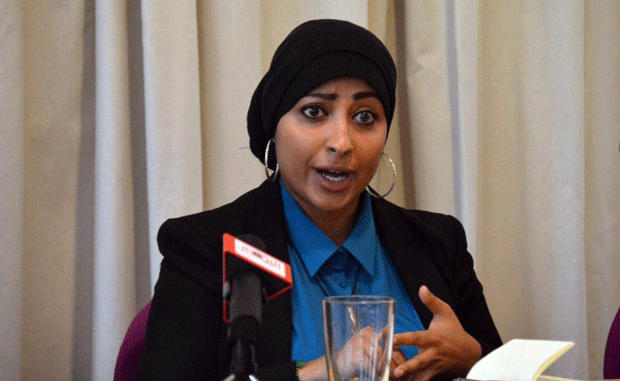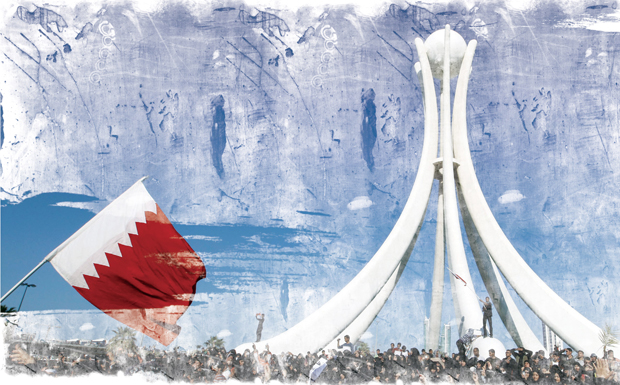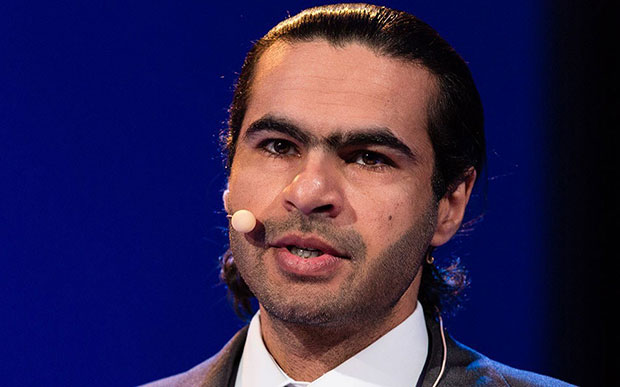11 Feb 2015 | Bahrain, mobile, News and features
Ali Abdulemam is a Bahraini blogger and founder of Bahrain Online, a pro-democracy news website and forum. He is also a member of research and advocacy group Bahrain Watch and a human rights defender with Bahrain Center for Human Rights. In August 2010, Abdulemam was arrested by Bahraini authorities, accused of “spreading false information” and imprisoned. He was released in February 2011 and subsequently went into hiding following anti-government protests and a crackdown by the government on protesters. Convicted in absentia for plotting to overthrow the government, Abdulemam was sentenced to 15 years in prison. In 2013, Abdulemam was granted political asylum in the UK.
Last week, Bahrain revoked Abdulemam’s citizenship along with another 71 Bahraini citizens, many of whom are journalists or bloggers. This is in contravention of Article 15 of the Universal Declaration of Human Rights, which states: “Everyone has the right to a nationality. No one shall be arbitrarily deprived of his nationality nor denied the right to change his nationality.”
This is Abdulemam’s reflection on losing his citizenship.
When I first registered on Facebook back in 2005, I wrote in my biography “Lost Identity”. It wasn’t an expectation of what is going to happen to me 10 years on, so much as expressing my thoughts regarding “identity”, and how it works in everything around me, how it affects me, affects my way of thinking, the way I look into other people, the way I define things, this century we can call it the “Identity Era”.
I first heard the news about the stripping of my nationality while I was talking with a friend on the phone. A popup message in Whatsapp appeared, saying: “Urgent. 72 citizenships revoked.” I told him “I think my citizenship has been revoked” and he laughed at me. Hearing him laughing I opened the link to see the names and scrolled down to No. 49 and there was my name “ Ali Hasan Abdulla Abdulemam”. I confirmed it to him. I said: “I think yours is also there” and scrolled down to No. 70. It made him stop laughing when I told him: “Your name is there as well”.
The first thing I did it was to tweet: “When I woke up this morning I was Bahraini, and when I wake up tomorrow I will be Bahraini”. I am sticking with my identity. I don’t want to leave it. Now, I have my own definition of the “identity” that I love and the main part of this identity is not “lost” it is “BAHRAINI”. It is not for the government to give it or take it away, it is not for them to take me from my roots, I will not accept to be unrecognised by the world. I will keep telling myself, my kids, and my friends that I am from the country that created the “Lulu” revolution (the uprising of 2011 named after the Pearl or Lulu Roundabout that was the site of demonstrations against the government).
“What does it mean to be Bahraini?” is a question with different answers depending on the time you want the answer. I got to know the real meaning of this question when I first left jail at the end of February 2011 at three in the morning and went directly to Lulu square where the protesters were freely sleeping in peace. I felt the dignity and smelled my real “identity” which I almost lost inside prison, when they tortured and threatened me. I felt they were targeting my identity not targeting me personally: those officers who imprisoned and tortured me didn’t know me, hadn’t met me before, they had a problem with me being different from them, they wanted me to be like them.
Now I am stateless, I don’t know how I will be able to visit my aged mother, my brothers, sisters and my friends. There are so many places I love in Bahrain that I can’t imagine I will die before I visit them again: that beach I use to play in it when I was kid, that unpainted wall with graffiti that says “the parliament is the solution” from the 1990s. I still want to take a selfie with it. I miss going to Spalion cafe where my friends are still gathering to share stories and chat about culture, politics, religion etc. and again to ask Abbas the waitress for “one bastard tea”. The most important place I want to visit, and spend as much time as I can is the cemetery where my father has rested in peace for the past six years. I haven’t been there for almost five years; my father is the first person who taught me what is meant to be Bahraini.
There is a proverb my father used to tell me when I was a child: “Those who disown their roots, don’t have any”, and that’s what I want to tell my nine year old son. I will point his finger to that beautiful, tiny island in the gulf and tell him “Your father came from here, and here where we belong”. I refuse to recognise this decree by the king, I will keep writing I am Bahraini in any application form. I will not accept to be “Lost Identity” again, I have an identity and I am proud of it.
This article was originally posted on 11 February 2015 at indexoncensorship.org
3 Feb 2015 | About Index, Bahrain, Campaigns, mobile, Statements
On 31 January 2015, Bahrain’s Ministry of the Interior revoked the citizenship of 72 individuals, including journalists, bloggers, and political and human rights activists, rendering many of them stateless – its latest attempt to crack down on those critical of the government.
“Bahrain is using citizenship, the most basic of human rights, as a weapon to intimidate and silence critical voices,” said Index CEO Jodie Ginsberg. “This latest violation of international human rights standards comes amid continuing attempts to suppress free expression in the country.”
The Ministry of Interior published a statement claiming that “each citizen of Bahrain has the responsibility to act in ways that do not harm the interests of the Kingdom.” Alongside spying, financing terrorism, participation in terrorist actions, the statement lists: “defaming the image of the regime, inciting against the regime and spreading false news to hinder the rules of the constitution;” “defaming brotherly countries” and “inciting and advocating regime change through illegal means” as justification for their decision.
Sayed Ahmed Alwadaei, Director of Advocacy for the Bahrain Institute for Human Rights and Democracy, and who is among those who had their citizenship revoked, said: “Bahrain has forcefully stifled, through both force and national law, any form of free expression through their vicious crackdown against free thinking. They have now turned to wiping out the only identity held by individuals exercising their rights to call for human rights and democratic reform; their virtue of being a Bahraini. The nature of belonging to a country since ones existence has now become another tool used by the government to strangle its critics with impunity.”
Ali Abdulemam is a human rights and online activist who also had his citizenship revoked. He said: “revoking the citizenship in Bahrain is used as a tool of punishment and instills fear. It sends a message to other activists and freedom fighters to stop their activities or they will face the same situation.”
Index on Censorship joins Americans for Democracy and Human Rights in Bahrain (ADHRB), the Bahrain Centre for Human Rights (BCHR) and the Bahrain Institute for Rights and Democracy (BIRD) in condemning the continued use of citizenship revocation by the Government of Bahrain as a reprisal against human rights activists, journalists and pro-democracy campaigners, and calls on international governments to ensure Bahrain meets its human rights obligations.
30 Jan 2015 | Bahrain, mobile, News and features

Maryam Al-Khawaja spoke out in October for the release of fellow human rights activist Nabeel Rajab. (Photo: David Coscia for Index on Censorship)
Nine people have been arrested in Bahrain for “misusing social media”, a charge which is punishable by a fine or up to two years in prison.
Human rights defender Nabeel Rajab was last week sentenced to six months in prison over a tweet he posted which was deemed insulting to public institutions. Rajab has been bailed, and tweeted on 21 January that he will appeal his conviction on 11 February.
Human Rights Watch has dedicated seven pages of its 25th annual report to Bahrain. The World Report 2015, released on Thursday, reviews the human rights situation in over 90 countries.
The report states that over 200 defendants have been sentenced to long stints in prison by the Bahraini courts on charges of national security or terrorism, with at least 70 of those being sentenced to life.
It says: “Bahrain’s courts convicted and imprisoned peaceful dissenters and failed to hold officials accountable for torture and other serious rights violations. The high rate of successful prosecutions on vague terrorism charges, imposition of long prison sentences, and failure to address the security forces’ use of lethal and apparently disproportionate force all reflected the weakness of the justice system and its lack of independence.”
In December, co-director of the Gulf Center for Human Rights (GCHR), Maryam Al-Khawaja, boycotted a court hearing which saw her sentenced to one year in prison. Al-Khawaja was charged with assaulting two policewomen last year when she traveled to Bahrain to visit her father Abdulhadi, who is currently serving a life sentence for his involvement in anti-government protests in 2011. In related news, the GCHR website was yesterday reportedly blocked in the United Arab Emirates.
Al-Khawaja’s sister Zainab was arrested in October on charges of insulting the king, and gave birth to her second child just a few days before being sentenced to three years in prison. She was then sentenced to an additional 16 months less than a week later, on separate charges of insulting a public official.
This article was published on 30 January 2015 at indexoncensorship.org
26 Jan 2015 | Events, mobile

Lord Avebury, the Vice Chairman of the Parliamentary Human Rights Group cordially invites you to a press conference on:
Four years of revolution: Bahrainis insist on political change
Four years ago the people of Bahrain flocked to the streets in their thousands seeking fundamental political change after decades of discriminatory rule. They were repressed by the regime which adopted reprehensible tactics including systematic torture, extra-judicial killing, and the revocation of citizenships. The UK Government has chosen to stand by the regime, turning a blind eye to its rights abuses. It is time for the UK to change direction on Bahrain starting by designating it as a “country of concern” in line with the Foreign Affairs Committee recommendations.
WHERE: Fielden House, 13 Little College Street, London SW1P 3SH
WHEN: Tuesday 10 February 2015, 11:00am



